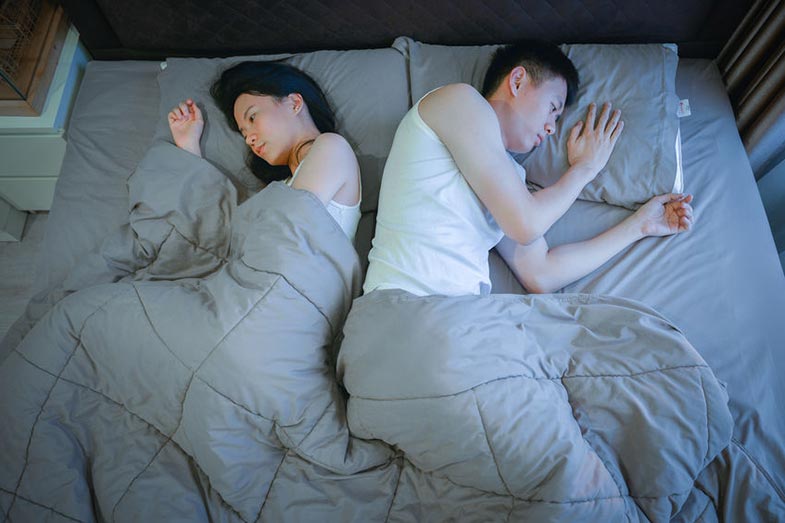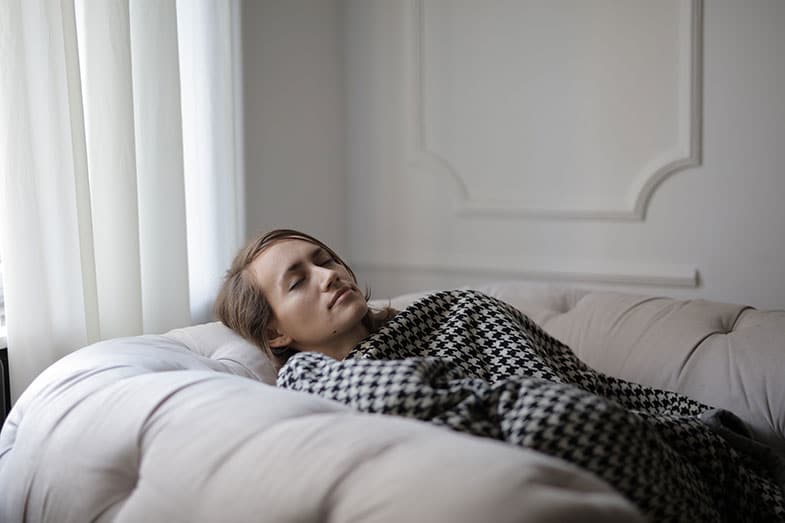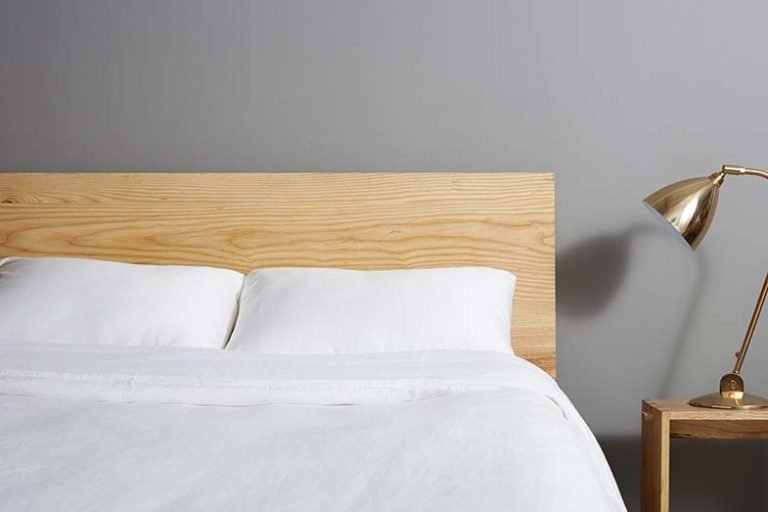Why Do I Sleep Better on the Couch Than in My Bed?
Disclosure: We may get commissions for purchases made through links in this post.
Some nights when I can’t sleep, I’ll head to the couch where I can usually fall asleep within minutes. Since this happens regularly, I decided to find some answers.
Why do I sleep better on the couch than in my bed? There’s no pressure to sleep on the couch, unlike the bed where sleep is expected. Many people go to bed out of habit and not because they are tired. This creates a tendency to stay awake. The bed then becomes associated with anxiety and not sleep.
If you’ve been sleeping on the couch regularly, it’s important to find out why so that you can better understand the impact it has on your daily life. There are many reasons why which we will explore in this article. If it is because your bed is uncomfortable, perhaps it’s time for a new mattress.

Some couches can also be used as a bed. These are known as sofa beds or pullout sofas. They usually have a metal frame and mattress underneath the sofa that can be opened up to make a bed.
Take a look at these three popular Amazon products excellent for anyone who prefers the couch over the bed.
| AmazonBasics Foldable, Metal Platform Bed (view on Amazon) |
Linenspa 8 Inch Memory Foam Mattress (view on Amazon) |
| Made of durable steel, the AmazonBasics platform bed gives an excellent foundation for a mattress. It’s quick to set up and does not require a box spring. | The Linenspa hybrid mattress is made with hypoallergenic memory foam and offers the support of an innerspring, medium-firm mattress. |
No Pressure
Getting good sleep can be difficult, especially if it’s the night before an interview or exam. There’s pressure to get a good 8 hours; however, anxious thoughts keep you awake and only get worse as the night goes on. Eight hours of expected sleep turns into 4, or even none. Once you realize there won’t be any rest, you move to the couch. The new environment instantly relaxes you, and it feels like a weight has been lifted. You drift off to sleep with ease.
The couch is often in the living room, which offers a different atmosphere to sleep in. It’s one of the more popular places in the house which can help sleeping there feel more comforting. The bedroom is usually more isolated. The living room is also a peaceful environment that conveys family, care, and relaxation. It’s where you can enjoy yourself and unwind from a long day. The TV is available, which provides that extra bit of comfort when you need it. The couch, and its surroundings, create a positive place to free your mind from stress and get to sleep quicker than your bed. In your bedroom, you may feel like you have to sleep, but in the living room, there’s no pressure.
Insomnia

Insomnia is a sleep disorder where individuals have trouble falling asleep and staying asleep. It can have a significant impact on one’s overall health and lifestyle. Insomnia may arise on its own or be the result of another issue. Insomnia can be identified as acute or chronic, depending on how frequent it happens. Acute is when it generally occurs less than a month. This is common among those who experience stress, an illness, or even just jet lag. Chronic insomnia can also be from stress but occurs longer, usually more than a month.
Common Symptoms of Insomnia Include:
- Trouble sleeping
- Frequently waking up during the night
- Waking up too early
- Fatigue
- Irritability
There are many causes of insomnia. It can be from medical conditions such as asthma, allergies, or pain, psychological reasons such as depression or anxiety, and lifestyle such as diet or habits, which result in poor sleeping patterns.
If your bedroom is a stressful environment, such as being at an extreme temperature, having bad lighting, noises, or smells, it can lead to insomnia. It is also psychological, where you have conditioned yourself to associate your bed with stress because of thoughts related to work, school, or other demanding things.
Here Are Some Other Common Causes of Insomnia:
- Daytime naps
- Constant worry
- Pain from exercise
- Poor habits
- Sleeping next to someone
Psychophysiological Insomnia
Sleeping on the couch instead of the bed may be related to psychophysiological insomnia. This is when you can’t sleep because you are worried about not getting enough sleep for the next day. It involves constant checking of the time, looking at the phone, or just generally being too focused on trying to sleep. Those with this type of insomnia often sleep better away from home, such as in hotels. Even though the couch is at home, it offers a different environment, which usually helps to remove frustration associated with having to sleep.
Treatment
Insomnia goes away once the underlying issue is identified and fixed. Take careful note of how you go about your day and how you feel. If you think you have insomnia, speak to your doctor to better understand what the causes are and what you can do to prevent them. For instance, it may relate to your sleeping environments, such as having too much light or noise. Fixing these problems may help you understand why the couch has been favorited between the two. If you can’t sleep, it is often recommended to get up and do something else rather than lie awake. Once you are ready to sleep, then you should go to bed. This keeps your bed associated with sleep and not stress.
Not Sleeping Next to Someone

Sleeping beside someone can be an issue for many people. The limited amount of space, blanket hogging, and snoring are enough to keep most awake at night. From babies to adulthood, we learned how to sleep on our own, in our own way that is most comforting to us. When we eventually move in with someone and sleep in the same bed, we all of a sudden have to adjust to make it work. Some people are unable to make this transition and suffer many sleepless nights, even without discussing it with their partner. The couch, in this case, is an escape and a chance to sleep without any disruptions.
If you find it difficult to sleep next to your partner, bring it up to them so that you can avoid further sleepless nights. One solution is to get a bigger bed (view on Amazon). If you currently sleep on a full-size mattress, upgrade to a queen, or even a king. This allows more than enough room to sleep without distracting one another. Another tip is to limit distractions. The bed shouldn’t make a lot of noise when there is movement. Make sure to test the mattresses at the store before making a purchase. Instead of sharing one blanket, separate ones should be used. This avoids one person pulling the blanket off the other, exposing them to the cold. Improve the quality of your sleep by investing in good sheets, blankets, and pillows. It’s easier to sleep beside someone if the bed is comfy and cozy. If they snore or are noisy sleepers, use earplugs to block out everything. Using separate beds is the last resort and an option if both of you come to an agreement that health is a priority.
Tension in the Bedroom

Relationships are fulfilling, but living with someone full-time takes a lot of adjustment. If you live with a partner, there will be instances when you will experience a strain in the relationship. It may be due to factors that are outside your control, but it can put a damper on the quality of your sleep. It is never easy to drift off when you’re lying beside someone who wants to talk, especially if you are not ready to do so.
Tension can be evident in the bedroom, especially when there are just the two of you, and you can’t avoid a serious talk, or worse, ignoring each other. The desire to sleep will surely go out of the window in those times. So the couch is an escape during these situations. You get home after a tough day’s work, have some snacks, coffee, or a stiff drink, and you sit down on the couch to rest. If you fall asleep there, it can easily relate to tiredness and not avoidance. Even if some problems are going on between you and your loved one, it will seem easier to deal with when you’re not inside the bedroom. The pressure is not too much to bear when there are plenty of distractions. Of course, you will eventually have to deal with the issue, but not until you are ready. Perhaps sleeping on the couch is your unconscious mind’s temporary escape from the anxiety that the relationship is giving you. It is not an ideal solution, but the mind will find ways to cope and give your body the sleep it needs.
Suffering From Grief
If you’re suffering from a loss of a loved one, grief may be a reason why sleeping on the couch is preferred. The bed can be a constant reminder of them.
Better Environment

Although you may think that sleeping on the sofa is better than the bed, it may just be the room you’re in. For example, the amount of light that you’re exposed to throughout the night can keep you awake and impact the quality of your sleep. If your bedroom lights up when a car goes by, or the moon shines through the blinds, this may be your answer for why the couch is better. Maybe the living room is in complete darkness. This goes a long way towards having a better sleep.
Different rooms in the house may have different temperatures. This can affect how you sleep at night. If your room is too warm, it can be almost impossible to sleep since it may cause sweating or frequent awakenings. The living room may be cooler since it’s in a more open space. If you’re too cold, sleeping on the couch may provide easier access to more blankets in a nearby closet, or you may have an electric fireplace nearby. With a quick flick of the switch, you’ll be warm and relaxed in no time.
When you sleep on the couch in the living room, you may be further away from electronics that could be disturbing your sleep. The bedroom may have a computer, a TV, and your phone next to you. You’re surrounded by devices! The living room probably only has television, but for the most part, it is free from electronic distractions.
More Comfortable
The couch may simply be more comfortable than your bed, especially if it’s a La-Z-Boy or futon. A bed isn’t always best suited for a good night’s rest. The couch may have softer (or firmer, depending on what you prefer) cushions to lie on. The armrest provides support for your head and keeps it elevated. There are sometimes more pillows on couches to surround yourself with. If the coffee table is there, it’s easier to sprawl out by extending a leg onto it. There’s always the option to curl up against the back of the couch, which makes you feel more cozy and secure.
Convenience and Familiarity

Have you ever fallen asleep on the sofa while watching television or reading a book? Or sat down with no intention to sleep, but after a few minutes, you’re eyes are heavy? After a long, hard shift at work, the couch is a break from the tiresome day. Once you sit down, it can be a lot of work to get back up and head to bed, initiating the routine of going back to work all over again.
This is a familiar situation for most people since you naturally gravitate to the couch when you want to relax, so you’ve associated it with comfort. The familiar feel of your body lounging and just letting go of the day’s worry is so inviting that you don’t even give it a second thought. On the couch, there is no need to make preparations for going to bed, like what you do in the bedroom. You don’t need to shower, go through your bedtime routine, change your clothes, and whatever else you may do before going to sleep. The couch is always there, inviting you to plop down and unwind. It is like a ready-made bed, without the trimmings. The convenience it brings is unbeatable. You can put your feet up and settle down with your favorite TV show or movie. Before you know it, you’re off to dreamland.






